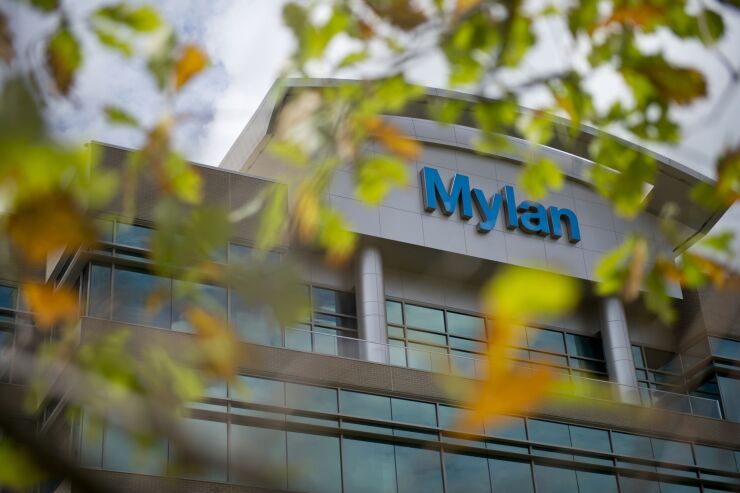Mylan NV misled investors for at least a year about a Justice Department investigation into the allergy shot EpiPen that would eventually cost the company nearly $500 million, the U.S. Securities and Exchange Commission said Friday.
The settlement appears to close one part of a long-running saga over a product that boosted Mylan’s sales but also brought controversy. Under the agreement with the SEC, first disclosed as a settlement in principle by Mylan in July, the drugmaker will pay $30 million.
The SEC lawsuit details years of Mylan’s efforts to fight allegations it overcharged taxpayers, and then negotiating with the government over a settlement. Neither the investigation nor the potential settlement was disclosed to investors while those events were ongoing. The company in October 2016 announced a settlement with the Justice Department for $465 million.

“Investors were kept in the dark about Mylan’s EpiPen misclassification and the potential loss Mylan faced as a result of the pending investigations,” said Antonia Chion, associate director of the SEC’s Division of Enforcement.
Controversial product
The SEC settlement is the latest black eye for a company that’s no stranger to controversy. Mylan has been named in lawsuits by state attorneys general that accuse 20 drugmakers of conspiring to carve up the market and raise prices on more than 100 generic drugs. Democratic members of Congress have said the company has stonewalled their inquiries into its conduct. And the company has struggled to resolve a more than a year old supply shortage of EpiPen, even as copycat competitors have come on the market.
Mylan has said that it acted properly and that its executives did not conspire to fix prices. It has also said that it is cooperating with investigations. EpiPen is manufactured by a Pfizer Inc. subsidiary and sold by Mylan, and the companies have said they are working on the supply issue. Pfizer and Mylan in July struck a deal to combine Mylan and Pfizer’s older-drugs business.
The EpiPen settlement relates to a complex program in Medicaid, the federal-state health program for low-income people, that’s meant to get the government deep discounts on drugs. Under the program, almost all drugs are subject rebates to the government. But generics, which are typically lower-priced and have slim margins, pay a much smaller rebate than brand-name products.
Even though EpiPen faced little competition and the company had increased the price by hundreds of dollars, it had been classified as a generic product under the discount program. In 2013, the Centers for Medicare and Medicaid Services told Mylan that EpiPen “has an incorrect drug category” in a government database, and that the company needed to verify and update the information.
1997 letter
Mylan’s justification for calling EpiPen a generic product was a 1997 letter from the government. But inside the company, executives raised doubts about whether the letter was sufficient, according to the SEC.
The 1997 letter was “basically just done as a result of a conversation two guys who were there at the time had,” one Mylan executive said in an internal email, according to the SEC lawsuit. If there had been a new review, “they would have been denied given today’s market size and that ours was a loose interpretation to begin with,” said the executive.
In November 2014, the SEC said, Mylan received the first Justice Department subpoena as part of a civil investigation into whether the company had misclassified the drug and cost taxpayers millions of dollars. At the time, about 20 percent of EpiPen’s $1 billion in annual sales came from Medicaid, according to the SEC.
For the next year, Mylan argued that the government should drop its investigation. In response, the government sent more subpoenas, and had the company to sign an agreement extending the statute of limitations. In October 2015, however, Mylan began to share estimates of potential damages with the Justice Department, saying that in one quarter in 2015, calling EpiPen a generic had let the company avoid somewhere between $12 million and $42 million in rebates to Medicaid.
| Oct. 2014 | CMS tells Mylan to change EpiPen’s classification |
| Nov. 2014 | Mylan gets first DOJ subpoena on EpiPen |
| Aug. 2015 | Mylan estimates damages of $12-$42 million for one quarter in 2015 |
| May 2016 | Mylan privately estimates 2015 damages of $114 million to $260 million |
| July 2016 | Mylan offers $50 million settlement; DOJ rejects offer |
| Oct. 2016 | Mylan announces $465 million settlement with DOJ and discloses investigation to investors |
In 2014 and 2015, Mylan told investors in filings that it was discussing the matter with the Centers for Medicare and Medicaid Services. But the SEC said that the company misrepresented the government’s position, downplaying its risk.
Mylan said that it believes the SEC settlement is the right course of action. “The company continues to be committed to the highest levels of integrity with respect to all aspects of its business operations,“ it said in a statement.
The company would later produce larger estimates, but still not tell investors that it was under investigation or might have to pay damages, the SEC said. “Mylan knew or should have known that the total possible loss arising from DOJ’s claims was exponentially higher than these amounts,” the SEC said in its lawsuit.
Accounting rules say that companies are supposed to disclose liabilities when there’s a reasonable possibility of a loss. The SEC said that because it didn’t tell investors, the company ended up overstating its profits.
David Maris, an analyst with Wells Fargo & Co., said the SEC settlement was just the end of one chapter. The company is still facing other government and private inquiries over EpiPen, Maris said. He has a “market perform” rating on the shares.
“This does not put the entire EpiPen situation behind Mylan,” he said.
— Riley Griffin and Matt Robinson
Bloomberg News





